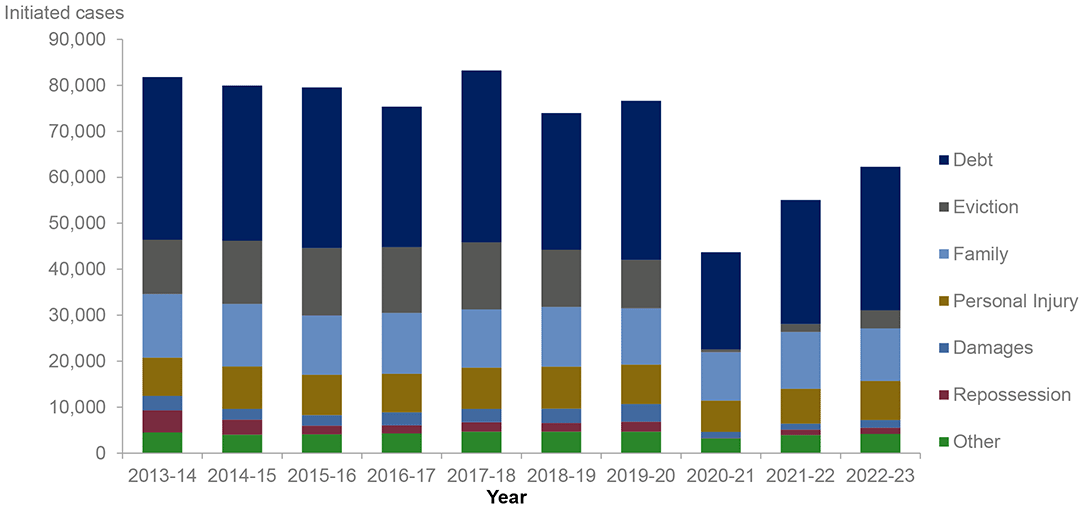Civil justice statistics in Scotland 2022-23
Statistics on civil law cases in the Scottish courts together with other related information, such as statistics from the Scottish Crime and Justice Survey.
Introduction
Civil Justice Statistics in Scotland presents statistics on civil law cases in the Scottish courts together with other related information, such as statistics from the Scottish Crime and Justice Survey. The majority of court buildings were closed during the first nationwide lockdown resulting from the Coronavirus (COVID-19) pandemic. Innovations in processing civil business, initially to allow urgent cases to be progressed, and then moving to all other case types, were enabled by Coronavirus (Scotland) Act 2020 emergency legislation. This allowed for a range of measures including electronic submission and signing of documents, and virtual hearings. At the outset of the pandemic some civil court hearings were able to proceed by way of written submissions and telephone hearings before moving to a general presumption of virtual Webex hearings. Civil justice case volumes for 2020-21 were noticeably lower than previous years. In both 2021-22 and 2022-23, case volumes generally increased from the previous year, but they are still much lower than pre-pandemic volumes. It is therefore unlikely that the data is representative of longer term trends in civil business, and this should be borne in mind when comparing statistics for 2020-21, 2021-22 and 2022-23 with earlier years.
There were 60,943 civil law cases initiated across the Court of Session and sheriff courts in 2022-23 (the figure excludes summary applications which are however included in Figure 1 repossessions). This represents an increase of 13% from 2021-22.
Figure 1: The most recent ten years show a general downward trend in initiated cases, latest figures show gradual recovery from the pandemic
Cases initiated in civil courts, 2013-14 to 2022-23

Key points at a glance:
- The Coronavirus (COVID-19) pandemic and associated public health measures have had an impact on civil justice during the years 2020-21 and 2021-22. This resulted in lower volumes of cases being initiated in civil courts. In both 2021-22 and 2022-23, case volumes generally increased from the previous year, but they are still much lower than pre-pandemic volumes. It is therefore unlikely that the data is representative of longer term trends in civil business, and this should be borne in mind when comparing statistics for 2020-21, 2021-22 and 2022-23 with earlier years.
- Debt cases made up 51% of principal craves initiated at civil courts in 2022-23. In line with overall cases, debts recorded increased from 2021-22 and are nearly at pre-pandemic levels.
- Eviction actions initiated made up 6% of principal craves initiated at civil courts in 2022-23.
- Family cases made up 19% of principal craves. Divorce and dissolution made up 75% of family cases initiated in 2022-23.
- Just under half (49%) of personal injury cases were raised in the national Sheriff Personal Injury Court.
- Eighty per cent of damages cases were initiated under ordinary cause in 2022-23. Fifty-four per cent of the ordinary cause cases disposed of had a decree of absolvitor.
- After a large Covid-related fall in 2020-21, repossessions increased by a further 14% in 2022-23, building from 2021-22. This brings them closer to pre-pandemic levels. However, initiations are still 39% lower than 2019-20.
- All sheriffdoms in Scotland experienced an increase in initiated cases from 2021-22, ranging from 11% in Grampian, Highlands and Islands to 15% in Lothian and Borders.
- In 2022-23, there were 13,149 civil legal aid grants, the vast majority of which were for cases in the sheriff courts.
- According to the Scottish Crime and Justice Survey 2021-22, around three-in-ten adults experienced civil law problems in the three years prior to interview.
Data sources
This publication presents management information from the Scottish Courts and Tribunal Services systems. There is also relevant information from the Scottish Crime and Justice Survey, Scottish Legal Aid Board and National Records of Scotland.
Statistical Tables
All tables referred to in this bulletin are available in the 'Supporting Documents' Excel workbook 2022-23 Main Tables for this bulletin. The workbook includes an ‘Index’ sheet, with information on how to navigate the tables, alongside a ‘Notes’ sheet, with relevant details to assist users when reading and interpreting results.
Contact
Email: justice_analysts@gov.scot
There is a problem
Thanks for your feedback